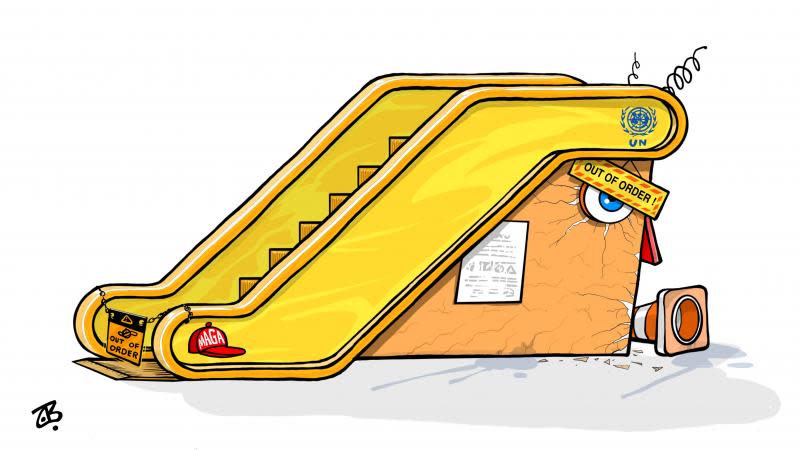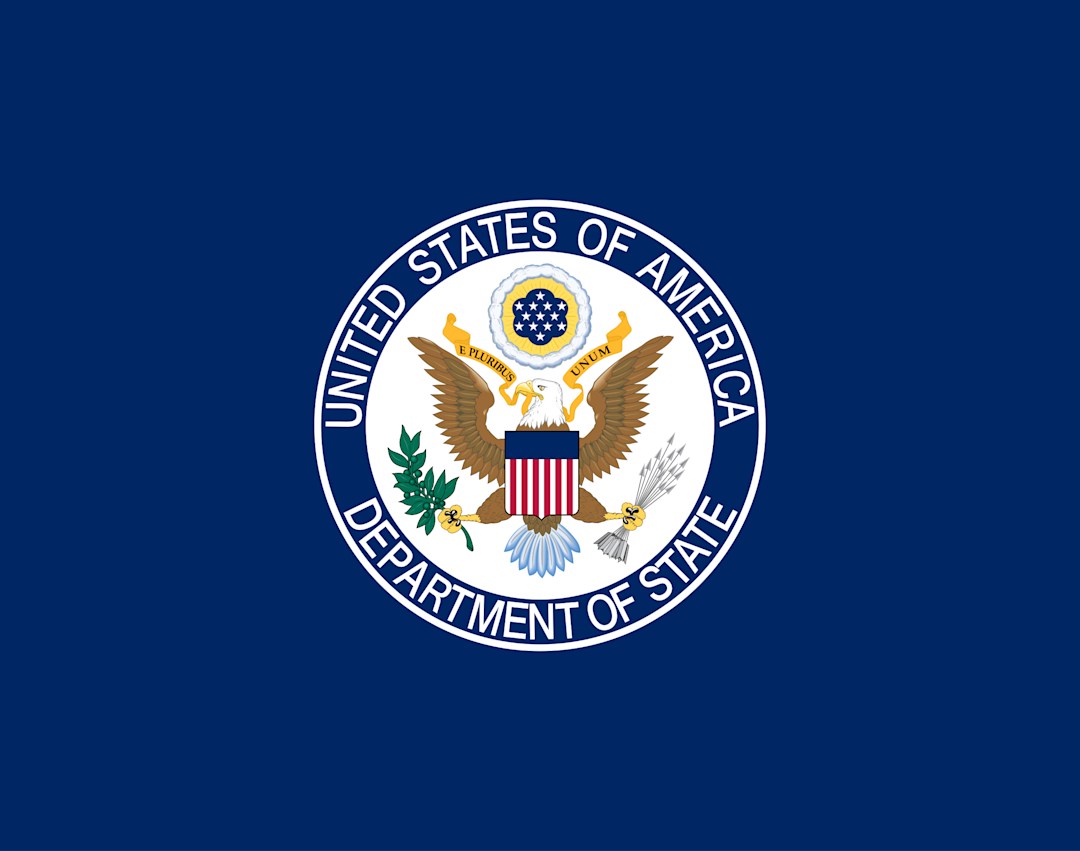Indeed, the UN is out of service.

Credit : Emad Hajjaj - https://www.cartoonmovement.com/cartoon/trump-escalator
On September 23rd, Donald Trump was briefly delayed by an escalator malfunction upon his arrival at the United Nations Headquarters. This incident is not without resonance : it calls to mind the budgetary cutbacks that the UN has faced since Trump’s return to the White House. Indeed, last January, the American president ordered the suspension of U.S. funding for all foreign aid representing more than 2.49 billion dollars, according to figures reported by The Guardian. The United Nations, whose very essence lies in multilateralism, now finds itself entangled in a financial crisis at the very moment when geopolitical tensions are reaching their peak. Is multilateralism truly in a state of crisis ? What exactly do we mean when we invoke the notion of multilateralism ?
The freezing of certain U.S. contributions, along with delayed payments from member states through mandatory assessments, has paralyzed humanitarian aid programs. Consequently, the UNHCR, responsible for delivering life-saving assistance to 122 million people has likewise seen its operations severely compromised. The United Nations’ funding problem is not new; it is, in fact, structural. Member states are required to pay a mandatory contribution, yet many do so late or not at all. However, the greater share of the organization’s budget comes from voluntary contributions, which explains both the fluctuations and the inherently political nature of its financing. As illustrated here, when a state such as the United States disapproves of UN action, it may reduce its funding - one of the organization’s largest sources of support. Ultimately, financial participation is not an obligation but rather a commitment made by states, one that remains vulnerable to the political tensions inherent in international affairs.
But the UN’s crisis is not limited to its financial difficulties; it is also, and above all, a crisis of political legitimacy. On that same September 23rd, several countries proceeded to recognize the State of Palestine and, among them, France. This recognition brings to sixteen the number of EU member states that have done so, and to 158 the total number of states worldwide that have officially recognized Palestine. While these declarations were anticipated, they highlight a key issue : recognition alone does not translate into effective multilateral action. Then, coordinated initiatives remain limited, and the UN often seems reduced to a forum for discussion rather than a mechanism for decision-making. Even though some peacekeeping operations have been successes as in past missions in Cambodia or Côte d’Ivoire - the world today is far more polarized. Some peacekeeping issues have become highly politicized and now involve a growing number of actors, often leading to deadlock within the Security Council.
On several occasions, attempts to adopt resolutions calling for a ceasefire or an official mediation process were blocked by the United States’ use of its veto power within the Security Council, thereby preventing any coordinated action by the United Nations. If multilateralism is indeed in crisis, then within the UN it is being held hostage by the veto power of an all-powerful Security Council. Consequently, diplomacy increasingly operates at regional or “minilateral” levels, where smaller groupings of states can act more decisively. ASEAN’s Indo-Pacific strategy, the G7 and G20’s trade initiatives, and the EU’s regulatory leadership on artificial intelligence and commercial ethics exemplify how regional or selective multilateral frameworks can achieve results more efficiently than the broader UN system. This shift, however, does not necessarily signify the end of multilateralism ; it rather reflects an adaptation to current political realities.
At the same time, the UN continues to host major global negotiations and initiatives. The COP climate conferences, for instance, remain a critical platform for setting shared objectives, even if these commitments are largely voluntary and non-binding. The organization still facilitates dialogue, establishes norms, and provides legitimacy to international agreements. On the occasion of the institution’s 80th anniversary, many figures and intellectuals have called for a rethinking of the United Nations to better adapt it to today’s world, which has once again become multipolar. In this potential “crisis of multilateralism,” the UN nevertheless remains a major forum for discussion, bringing together both states and NGOs, and effectively enabling the pooling of resources as well as scientific and societal research.
Ultimately, the so-called “crisis of multilateralism” can be understood as a strategically charged discourse that seeks to compel a redefinition of the rules of the game among various actors. For many, multilateralism, along with the institutions of dialogue and peacekeeping such as the United Nations, must remain at the heart of international cooperation, though they are in need of fundamental reform. However, the rapid pace of political change and the instability brought about by U.S. foreign policy - oscillating between the Trump and Biden administrations - compel us to reconsider the nature of international cooperation, now increasingly shaped by new actors in areas such as climate policy, scientific research, and, of course, peacekeeping.
Sources.
United Nations (2024) Our Common Agenda: Policy Brief — UN 2.0. United Nations. Available at : https://www.un.org/sites/un2.un.org/files/our-common-agenda-policy-brief-un-2.0-en.pdf
See the analysis of Cardenas, E. (2000) UN financing: some reflections. European journal of international law. [Online] 11 (1), 67–75.
Hosli, M. O. et al. (2025) Multilateralism and the United Nations Security Council: Voting, Power, and Coalition-Formation. 1st edition. Katyayni Champawat et al. (eds.). [Online]. Cham: Palgrave Macmillan.
Lilly, D. (2025) ‘The World Is Changing Rapidly: Can the United Nations Restructure to Stay Relevant?’, IPI Global Observatory, 29 April, Available at : https://theglobalobservatory.org/2025/04/the-world-is-changing-rapidly-can-the-united-nations-restructure-to-stay-relevant/
BBC (2025) ‘What does recognising a Palestinian state mean?’, BBC News, 30 July. Available at : https://www.bbc.com/news/articles/cvgp5z1vvj5o
Borger, J. & Roth, A. (2025) ‘UN aid agencies cut back operations after Trump’s 90-day funding suspension’, The Guardian, 28 January. Available at : https://www.theguardian.com/world/2025/jan/28/un-aid-cuts-trump-funding



